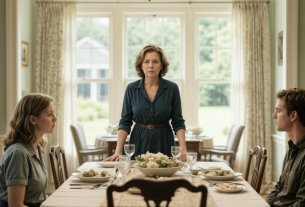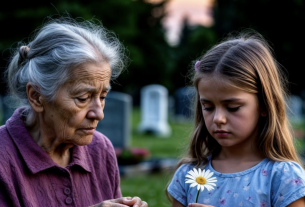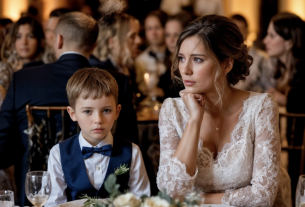Larisa Petrovna stood by the kitchen window, holding a cooled cup of tea in her hands. Outside the glass, familiar courtyards flashed by, gray nine-story buildings covered with the first October snow. For twenty-seven years, she had looked out this window. For twenty-seven years, she had cooked borscht in this kitchen, baked pies, and greeted her husband coming home from work. Now everything felt somehow foreign, as if she were seeing this apartment for the first time.
“Mom, why did you get up so early?” Andrey, her younger son, peeked into the kitchen, rubbing his sleepy eyes. At twenty-five, he still sometimes stayed overnight at his parents’ when work ran late.
“Couldn’t sleep,” Larisa replied briefly, without turning around. “Want some coffee?”
“Yes. Where’s Dad?”
“On a business trip. He’ll be back Friday.”
Andrey nodded and turned on the kettle. Larisa still faced away from her son but felt his gaze. A smart boy, always sensing when something was wrong.
“Mom, are you okay? You seem… I don’t know, strange lately.”
Larisa finally turned and tried to smile:
“I’m fine, Andryush. Just autumn blues.”
But you can’t fool your child. Andrey silently hugged her shoulders, and Larisa felt a lump rise in her throat. She wanted to tell him everything, to cry it out, but she couldn’t. Children must not know about their parents’ problems. This was her war, and she had to fight it alone.
It all began three months ago. Viktor had changed — distracted, thoughtful. Coming home later, speaking less, and when he did, it was in a formal tone, as if performing an obligation. Larisa blamed work. Their factory was going through hard times; the new director demanded more reports, more responsibility. Viktor, a seasoned chief engineer, was nervous, worried.
But then details started to appear. A new shirt he supposedly bought himself. The smell of unfamiliar perfume on his jacket. Strange calls after which he would step out onto the balcony and speak in a low voice. Larisa didn’t want to suspect him, didn’t want to become one of those wives who dig through their husbands’ pockets and check phones. But the suspicions grew like a malignant tumor.
And then, the day before yesterday, everything was revealed. Viktor forgot his phone at home, and Larisa was just mopping the hallway floor. The phone rang, and without thinking, she picked it up.
“Hello, Vitya?” — a woman’s voice, low and slightly hoarse. “Are we meeting today?”
Larisa froze. Her heart beat so loudly it seemed to echo through the whole house.
“Hello?” — the voice became insistent. “Vitya, are you there?”
Silence. Then short beeps. Larisa sank to the floor right where she stood, still holding the receiver. Viktor found her like that an hour later.
“What happened?” he rushed to her, but Larisa saw not only concern in his eyes but fear as well.
“The phone rang. Some woman. Asking if you were meeting today.”
Viktor went pale. He was silent for several seconds, apparently trying to figure out what to say.
“Lara, this… it’s not what you think…”
“And what do I think, Vitya?” Her voice was calm, surprisingly calm. “That you’re cheating on me? That you have a lover? That twenty-seven years of our marriage mean nothing to you?”
“Lara, please…”
“Don’t. Don’t explain anything. Just tell the truth. Yes or no?”
Viktor lowered his head. That gesture was enough.
That night they didn’t speak. Viktor went to his office; Larisa lay awake in the bedroom, eyes open till morning, replaying the past months, years. Searching for signs she missed, moments when everything began to change.
In the morning, Viktor left for work without breakfast. He said only:
“I need time to think.”
“Of course,” Larisa replied. “Think.”
But she was thinking too. And by evening, she made a decision.
First, she found out who the woman was. It wasn’t hard. Lyudmila Sergeevna Krylova, the new wife of the factory director. Thirty-eight, an economist working at a bank. No children. Photos online showed a well-groomed blonde with plumped lips and professional makeup. That low, hoarse voice had to belong to her.
Larisa studied her social media pages like an investigator studying evidence. Expensive outfits, restaurants, travels. The director-husband clearly spared no expense on his wife. And this woman was unlikely to give all that up for a chief engineer, even one with higher education and experience.
So for her, Viktor was just entertainment. An intrigue. A way to spice up a comfortable life.
Larisa closed her laptop and sat at the table. She needed to make a plan.
The next day she called a locksmith and ordered new locks. They installed them quickly while Viktor was at work. Larisa deliberately chose a day when he was late at a meeting.
In the evening, she sat in a chair by the window reading a book when she heard him trying to open the door. First surprised, then more insistently. Then a knock.
“Lara, open up. Something’s wrong with the lock.”
She went to the door but didn’t open it.
“I changed the locks.”
“What? Why?”
“I’ll open it; we need to talk.”
She let him in. Viktor stood in the hallway, confused. Larisa went to the living room and sat in a chair.
“Why did you change the locks?” he followed her.
“Sit down, Vitya. Let’s talk like adults.”
Viktor sat on the sofa opposite her. Larisa saw him nervous, clenching and unclenching his fists.
“I know everything,” she said calmly. “I know Lyudmila Sergeevna Krylova. I know she’s the director’s wife. And I know she’s not going to leave her husband for you.”
Viktor turned pale.
“Lara, I can explain…”
“No need. I’m not interested in your explanations. I’m interested in something else. Do you understand that if Krylov finds out about your affair, you’ll both suffer? You definitely will. And she possibly will too.”
“What do you want?” His voice was hoarse.
“I want a divorce. Civilized, without scandals. The apartment stays with me. You transfer it to my name, and we part ways. No one finds out, no one tells anyone.”
“What if I don’t agree?”
Larisa looked at him closely. This man had been her husband for twenty-seven years. Father of her children. She knew every habit, every gesture. And now she saw—he was afraid.
“Then I’ll call Krylov. Tell him about his wife’s affair with a subordinate. Let’s see what he says. And what your Lyudmila Sergeevna says.”
Viktor was silent. Larisa stood, walked to the window.
“You know, Vitya, I could have made a scene. I could have cried, begged, tried to get you back. But I realized—I don’t need that. I don’t need a man who chose another. I don’t need pity or condescension. I need freedom.”
“Lara…”
“Two days to think. If you agree—we go to the judge and arrange a settlement. If not—I call Krylov.”
She left the room, leaving him alone.
Viktor agreed the next day. They went to court like two unfamiliar business people settling property matters. Viktor was grim but signed all the documents. The apartment stayed with Larisa.
The divorce was finalized a month later. The children reacted differently. Olga, the elder, first tried to reconcile everyone but then realized her mother’s decision was final. Andrey was angry at his father, although Larisa asked him not to interfere.
“Mom, you know you can count on us, right?” he said. “If you need anything…”
“Thanks, son. But I’ll manage.”
And indeed she managed. The first months were hard. The silence in the apartment was oppressive, especially in the evenings. Larisa caught herself listening for sounds in the hallway, waiting for the door to open. But the door no longer opened.
But gradually, she began to notice other things. In the morning, she could drink as much coffee as she wanted, not rushing to make strong tea for Viktor. She could read in bed without turning off the light. She could watch her favorite films without hearing complaints about “women’s nonsense.” She could invite friends without asking for permission.
Work also became more enjoyable. Larisa worked at a library, and now she could stay late for evening events, participate in literary evenings, without thinking about an unhappy husband waiting at home.
Six months after the divorce, she met Viktor in a store. He had aged, looked gaunt. They greeted each other politely, like acquaintances.
“How are you?” he asked.
“Good. And you?”
“Okay. Renting an apartment near the factory.”
Larisa nodded. Didn’t ask about Lyudmila Sergeevna, though curious. But it didn’t matter.
“Say hi to the kids,” he said goodbye.
“I will.”
In the evening, she sat in her chair by the window, drinking tea and thinking about how her life had changed. Before, she had been afraid to be alone, afraid of old age, afraid she wouldn’t manage. Now she understood—loneliness is different. It can be bitter when you’re alone but dream of being with someone. Or it can be sweet when you’re alone because you chose it yourself.
The phone rang. Olga.
“Mom, how are you? Don’t you miss us?”
“No, daughter. I don’t miss.”
“You know what I thought? Maybe you should get a dog? Or a cat?”
Larisa smiled. Viktor never liked animals in the house.
“You know, that’s not a bad idea. I’ll think about it.”
“Or maybe sign up for dance classes? Remember, you wanted to learn tango when you were young?”
“I remember.”
“Mom, you know we love you? And that you have a lot of good things ahead?”
“I know, sweetheart. Thank you.”
After the call with her daughter, Larisa sat quietly for a long time. Outside the window, snow was falling, just like the day she learned the truth. But now it didn’t seem hostile. Just snow. Just winter. Just life going on.
She walked to the mirror in the hallway and looked at herself. Fifty-seven years old. Gray hair, wrinkles around her eyes, tiredness on her face. But something else—calmness. Dignity. Strength.
“Larisa Petrovna,” she said to her reflection. “It’s time to start living again.”
The next day she signed up for tango classes for adults 40+. She had always wanted to learn but Viktor considered it nonsense. Now no one considered her wishes nonsense. Now she decided what she wanted.
A month later, she really got a cat—a ginger, fluffy one with white paws. She named him Ryzhik. He purred in the evenings curled up on her lap while she read or watched TV. Simple, quiet happiness.
Andrey came on weekends, helped with household chores, though Larisa managed fine on her own. Olga called almost every day, telling about her family, about her grandchildren. Life flowed calmly, measured, and Larisa realized—she was happy. Truly happy for the first time in many years.
Sometimes she thought of Viktor, but without anger. More with regret—for the years they could have spent together if he hadn’t chosen another life. But what’s done is done. She had her own life now, and she intended to live it the way she wanted.
One spring day, when she was returning from work, a neighbor stopped her in the hallway:
“Larisa Petrovna, your ex got married again. Heard it from Maria Ivanovna.”
“Really?” Larisa felt slight curiosity but no more.
“They say to some young woman. She works in his office.”
“Well,” Larisa said. “I wish them happiness.”
The neighbor clearly expected a different reaction, but Larisa just smiled and went to the elevator. At home, Ryzhik awaited her, a documentary about Argentine tango, and a new cookie recipe she planned to enjoy that evening. Her life, her choice, her happiness.
In the evening, she stood by the same window where once she pondered her broken marriage. But now she saw not gray courtyards, but green trees, playing children, young couples walking beneath her windows. Life went on, and she was a part of it. Not someone’s shadow, not half of a whole, but an independent, complete woman.
The phone rang. Andrey.
“Mom, how are you? Maybe you’ll come to us on Sunday? Katya promised to make cutlets—your favorite.”
“I’ll come,” Larisa answered. “Definitely will come.”
And she thought: how good it is that she has children. How good that she has a future. How good that she found the strength to start over.
The snow outside had long melted, but Larisa remembered that winter day when her life broke in two. Now she knew—sometimes you have to lose to find. Sometimes you have to be alone to understand who you really are.
Ryzhik purred at her feet, children laughed outside the window, and somewhere in the city lived the man who once was her husband. But that’s another story. Her own story was just beginning.



